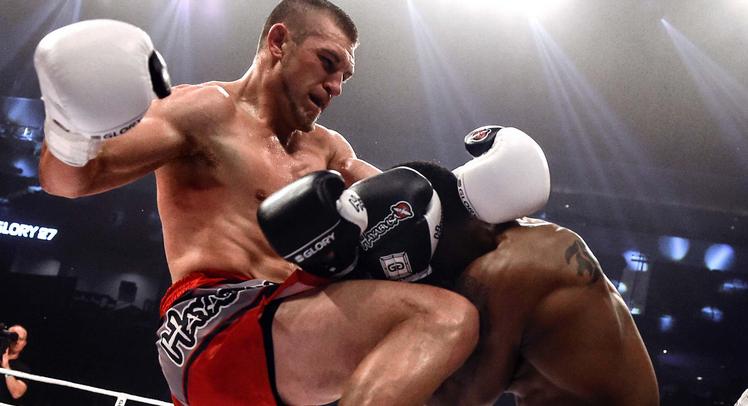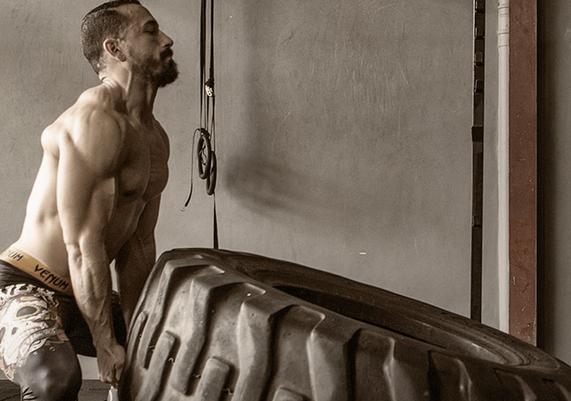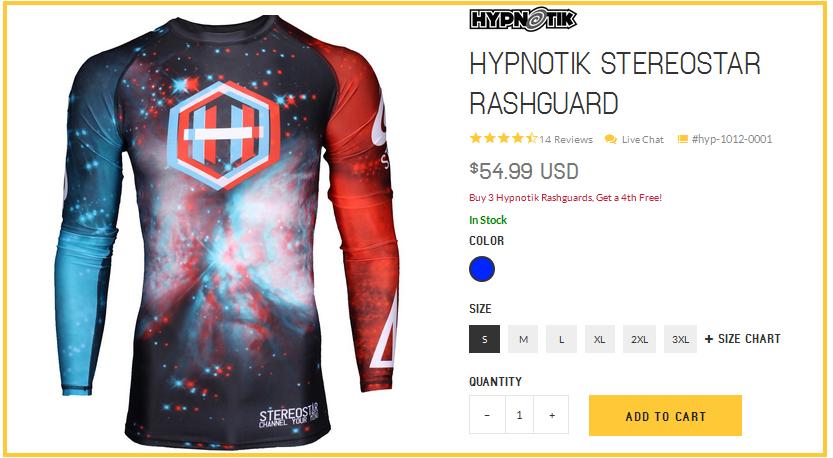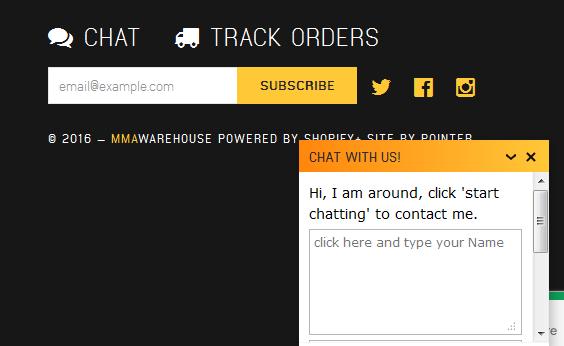Stalking the UPS man can save an entrepreneur time and money.
But it’s not without its dangers.
“I knew if I missed the UPS driver I’d have to drive thirty minutes to drop off all of the packages at the hub,” Mika Casey, founder of MMA Warehouse says. “Once I saw I had missed the pick up I threw the packages in the back of the car and started chasing him.”
It was 2007, and Casey was sleep deprived and exhausted.
Three years earlier, he had started selling mixed martial arts equipment and apparel online while also working long hours at his full-time job. With no warehouse, Casey had to get home from his regular job every day in time to hand off the prior day’s orders to UPS if he wanted customers to get their purchases quickly.
The day he missed the UPS man would prove pivotal.
“That was the breaking point,” Casey recalls. “I was so tired I didn’t have the energy to drive an hour round trip to the UPS store so I figured I’d try to chase him down somewhere in the neighborhood.”
Casey found who he was looking for, hopped out of his car, and charged toward the delivery driver with an armful of packages.
“Sir, your car!” the UPS driver screamed with alarm.
Casey had left his car in gear.
“I turned around and saw the car creeping right toward a house,” he remembers painfully. “The car crashed right into the side of the house, and that was my wake-up call.”
No one was hurt, and the damage was minimal.
But it was an incident that would draw Casey and his wife into the fight of their lives.
It’s Not About the Blood
“I’ve never been attracted to the sport because of blood or quick knockouts,” Casey says of mixed martial arts. “I love seeing great matchups, back and forth wars, and seeing fighters overcome adversity.”

That passion for MMA was born years earlier when a friend persuaded Casey to begin watching the UFC and afterward wound up attending a live UFC event. “I was hooked,” Casey says. “I flew back home and wanted to get into the sport immediately.”
But when Casey began searching for MMA training equipment and apparel online he found a void that needed to be filled. “That was my ah-hah moment,” he says. “I thought it’d be a great opportunity, especially if the sport got bigger.”
And grow the sport would.
The UFC, according to reports, generated $650 million dollars in 2015 as it continued to expand internationally and create crossover stars who are regularly featured in movies and on the covers of magazines like Sports Illustrated.

But if Casey was going to capitalize on the sport’s growth by creating a brand new channel for manufacturers of MMA equipment and apparel and curate nothing but the best, he’d have to make a decision scarier than stepping into the octagon. “I kept waiting for the perfect moment like a certain sales number to quit my day job,” Casey says. “But the day I left my car in gear because I was too physically tired to be behind the wheel any longer changed things.”
Casey’s wife was in his corner.
She and her sister had already quit their day jobs to focus solely on MMA Warehouse. Now, Casey would become full-time employee #3 at the company he founded.
Little did he know, the fight of his new company’s life would be against the very people on whom he would rely to support his business – people who were supposed to be on his side.
A $200,000 Punch in the Nose
“Initially, the ecommerce platforms we chose had everything we needed,” Casey says. “But they quickly became stagnant and didn’t keep up with the features we wanted to offer customers.”
The company, as was common as ecommerce evolved, leapfrogged platforms in its early days. The company was generating sales and riding the MMA wave of popularity as the sport became more mainstream, but the team just never felt comfortable.
“We wanted something that was future-proof,” Casey says. “We didn’t want to be a platform’s biggest client, we wanted something we could grow into, something that could evolve with us.”
Learn more: Prepare your business for the future of ecommerce
Casey suspected the company’s third platform would be its last. After a substantial initial investment Casey and his team were ready to take MMA Warehouse to new heights. But the company quickly learned it’d be on the hook for additional fees if it wanted to add features like a cart abandonment deterrent or to retarget site visitors.

“The sales people always told us, ‘Oh, it’s just a line of code you’ll have it up in a day,’” Casey says. “But it wasn’t as plug-and-play as we were led to believe.”
In reality, the desired features would take months and require expensive development, according to Casey. The final straw came two years after MMA Warehouse launched on this platform. Casey says existing users were told they’d have to upgrade or risk not having a responsive site.
The upgrade, Casey says, would cost $200,000.
“We told them this is nuts, we can’t do this,” Casey recalls. “That was not what we signed up for, and we should not have to pay huge sums of money just to keep our site current.”
It was an unfair fight.
But the ecommerce platform that was supposed to be in Casey’s corner was letting him down.
Time for a new cornerman.
How to Save $400,000 a Year
The monthly fees, extra development expenses, and the huge cost of upgrading to stay relevant to mobile users was too much for Casey and his team to bear. “Competitors had responsive sites and we didn’t,” Casey says. “From an ROI perspective, it was just too costly.”
So during the middle of its ecommerce fight, Casey switched cornermen.
“The customers love our new site,” Casey says. “We’ve always taken great photos of our products and we’re finally able to show those off.”

Casey replatformed with Shopify, an enterprise-level ecommerce solution for high volume merchants. In addition to a site that loads faster and looks better, Shopify also positioned MMA Warehouse to capitalize on the shift to mobile with a responsive site that fits perfectly on any screen. “Our mobile conversion rate jumped dramatically after switching to Shopify,” Casey says.
Here are a couple of metrics Casey provided to illustrate the improvement:
- Mobile conversion rates have averaged a 60% improvement since switching to Shopify
- Mobile traffic accounted for 35% of sales in a recent 30-day period
Besides not losing significant traffic after replatforming, Casey credits Shopify’s onboarding team and his designer, Pointer Creative, with improving the customer experience. “It was a very quick launch,” Casey says. “Everyone hit their deadlines, and it went as smoothly as a launch could go.”
The company is growing and now generates $10 million in revenue a year. Even more impressive though are the improved margins Casey expects after switching to Shopify. “We’re paying much less per month and no longer spending six-figures on developers,” he says. “Switching to Shopify is saving us $400,000 a year.”
Picking a New Fight
Instead of calling a developer when he wants to experiment or add a new feature, Casey does it himself now. For instance, when Casey wanted to experiment with a new customer chat application recently, he had it up and running in a matter of hours.

“I install 80-90 percent of the applications myself,” he says. “It’s as easy as installing apps on an iPhone.”
Casey credits Shopify with handling the technology so he and his team can do what they do best; curate the highest quality training equipment and apparel, efficiently manage inventory, and provide a level of customer service that differentiates.
No longer having to worry about platforms has also positioned Casey to better navigate an era in which he says the UFC has shifted its’ attention to the world stage. As the promotion expanded globally and began holding more events, cards have become saturated with fighters fans don’t always recognize or connect with.
“The popularity of the sport domestically has been flat to moderately higher which impacts our sales,” Casey says. “When I ask people who used to watch MMA why they no longer do, they repeatedly tell me they only know a handful of the fighters today.”
It’s one reason Casey launched Hypnotik, his own brand of MMA apparel and equipment. “You often don’t get a second chance to launch a brand,” Casey says. “We’re proud because it’s now our second best selling brand in just six months.”

To be successful in MMA, Casey says a fighter doesn’t have to be an expert in each discipline but must train in all of them. Similarly, he suggests entrepreneurs who focus on their weak spots and improve every facet of their skillset will rise to the top. “Maybe customer service isn’t your strong suit, but that doesn’t mean you shouldn’t invest in or work on it,” he says.
For Casey, it means balancing being dedicated to his business with living a healthy life that no longer includes chasing after the UPS man.
“No, there haven't been any other car crashes,” he says with a chuckle. “Business can be addictive, but I learned that’s no excuse. You have to take care of yourself first before you can take care of your business.”
Read more
- How Channelling “Your Inner Ten-Year-Old” Is the Secret to Brandon Steiner’s $50 Million Empire
- How Jones Soda Saved Itself from a Decade of Unprofitability and $58 Million in Losses
- How Interline Saves Hundreds of Hours a Year Using Flow to Automate Orders, Inventory & Refunds
- Mava Sports Buffed Up, Leaned Out, and Branded its Ecommerce Enterprise
- [Case Study] How Everything Went Right on Refurb.io's Unexpected $100,000 Sales Day
- How Nestlé Is Using Shopify Plus to Target Millennials by Making Adulthood Suck Less
- How The Maker Of Wooden Computers Grew Sales 10X By Helping Children Create, Not Just Consume, Technology
- Black Friday Scalability Allowed Bombas to Hit $50M in Annual Sales & Grow 300%
- How Discount Hockey Lifted Mobile Conversions 26% and Uses Shopify Plus to Sell On & Off the Ice
- How to Optimize Your Mobile Checkout Flow


